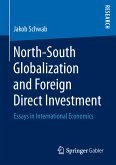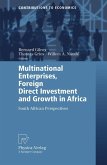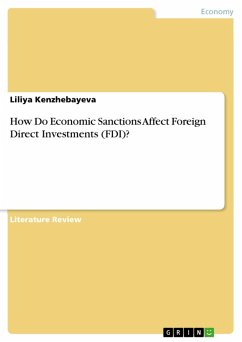Collected here are papers from the conference, Thinking Outward, which dealt with a range of issues related to the key players in this process - firms, home countries and host countries and the book will have a foreword from Jeffrey Sachs. In the wake of the financial crisis, these issues remain increasingly critical for developing countries.
Dieser Download kann aus rechtlichen Gründen nur mit Rechnungsadresse in A, B, BG, CY, CZ, D, DK, EW, E, FIN, F, GR, HR, H, IRL, I, LT, L, LR, M, NL, PL, P, R, S, SLO, SK ausgeliefert werden.
"More and more firms from emerging markets are becoming multinational enterprises. Their managers need to understand not only the managerial challengesinvolvedand the importance of community relations, but also the policy challenges and theglobalcontext in which they are expanding. This volume provides them with an excellent overview of the issues involved." - Roger Agnelli, President and CEO, Vale"The book is a substantive contribution to both academic thinking and also to public policy on the regulation of emerging economy MNEs." - Alan Rugman
"A timely book on an important topic: the rise of multinationals from emerging economies. The book covers both theory and public policy implications of emerging MNEs, from both home and host country perspectives, together with case studies of emerging multinationals from the BRICs (Brazil, Russia, India and China). A valuable contribution to a new and growing literature." - Lorraine Eden, Professor of Management and Mays ResearchFellow at Texas A&M University"A very welcome addition to a better understanding of developing country multinational firms, a topic that is likely to change the field of international business. The contributions by some of the key thought leaders and their critical stance will likely generate debate in years to come." - Alvaro Cuervo-Cazurra, Associate Professor, Sonoco International Business Department, Moore School of Business, University of South Carolina"The book is a substantive contributionto both academic thinking and also to public policy on the regulation of emerging economy MNEs. It has an good mix of theoretical/academic and practical/regulatory papers." - Alan M. Rugman, Professor of International Business, Director of Research, School of Management, Henley Business School, University of Reading
"A significant contribution towards a better understanding of the extent and implications of OFDI from emerging markets, combining fresh theoretical discussions with practical insights for both policymakers and the managers of multinational enterprises." - International Business Review
"The edited volume has several strengths. First and foremost, it bundles a large amount of contributions and opinions of several respected scholars in the domain of international business. Furthermore, the book is very up to date and contains a lot of relevant data. Moreover, all these conference papers complement each other and offer the reader detailed information about the various aspects of outward FDI from emerging markets. This conference volume will appeal to all those researchers involved or interested in outward FDI from emerging markets, while the non-technical approach makes it also accessible to executives and government officials." - EIBAzine, European Business Academy Newsletter
'Under the leadership of its founding director and lead editor of this volume, Karl Sauvant, the Vale Columbia Center on Sustainable International Investment has become a leader on issues related to foreign direct investment in the global economy, paying special attention to the sustainability dimension of this investment.' Thunderbird International Business Review
'This book, edited by Karl Sauvant et. al., presents both a wide and highly thoughtful evaluation of the rapidly expanding participation of emerging market MNEs in global outward FDI. The volume brings together contributions from some of the fields luminaries to shed new light on the developments in two primary issues, viz., the implications on developing new theory of the MNE, and the changing policy landscape facing both outward and inward FDI from emerging market MNEs. These two intellectual thrusts are complemented by specific area studies drawing empirical and anecdotal evidence covering FDI activity in the key emerging market economies.' Multinational Business Review
'Overall, the book is very well-structured and covers the main issues raised by emerging market OFDI from home and host country perspectives. It is a thoughtful and valuable contribution for scholars, policy makers, as well as for corporate executives to understand the new globalizing world economy and political challenges' The International Trade Journal
"These two edited volumes (Foreign Direct Investments from Emerging Markets and The Rise of Indian Multinationals) represent a timely addition to the growing collection of books on emerging market Multinational Companies (EMNEs). The two volumes add to this literature in several important ways. Perhaps most noteworthy of which is by explicitly tackling what is probably the major challenge in discussion of EMNEs, namely what is different about them theoretically. Several contributors these volumes address this question head on." - Journal of International Business
"A timely book on an important topic: the rise of multinationals from emerging economies. The book covers both theory and public policy implications of emerging MNEs, from both home and host country perspectives, together with case studies of emerging multinationals from the BRICs (Brazil, Russia, India and China). A valuable contribution to a new and growing literature." - Lorraine Eden, Professor of Management and Mays ResearchFellow at Texas A&M University"A very welcome addition to a better understanding of developing country multinational firms, a topic that is likely to change the field of international business. The contributions by some of the key thought leaders and their critical stance will likely generate debate in years to come." - Alvaro Cuervo-Cazurra, Associate Professor, Sonoco International Business Department, Moore School of Business, University of South Carolina"The book is a substantive contributionto both academic thinking and also to public policy on the regulation of emerging economy MNEs. It has an good mix of theoretical/academic and practical/regulatory papers." - Alan M. Rugman, Professor of International Business, Director of Research, School of Management, Henley Business School, University of Reading
"A significant contribution towards a better understanding of the extent and implications of OFDI from emerging markets, combining fresh theoretical discussions with practical insights for both policymakers and the managers of multinational enterprises." - International Business Review
"The edited volume has several strengths. First and foremost, it bundles a large amount of contributions and opinions of several respected scholars in the domain of international business. Furthermore, the book is very up to date and contains a lot of relevant data. Moreover, all these conference papers complement each other and offer the reader detailed information about the various aspects of outward FDI from emerging markets. This conference volume will appeal to all those researchers involved or interested in outward FDI from emerging markets, while the non-technical approach makes it also accessible to executives and government officials." - EIBAzine, European Business Academy Newsletter
'Under the leadership of its founding director and lead editor of this volume, Karl Sauvant, the Vale Columbia Center on Sustainable International Investment has become a leader on issues related to foreign direct investment in the global economy, paying special attention to the sustainability dimension of this investment.' Thunderbird International Business Review
'This book, edited by Karl Sauvant et. al., presents both a wide and highly thoughtful evaluation of the rapidly expanding participation of emerging market MNEs in global outward FDI. The volume brings together contributions from some of the fields luminaries to shed new light on the developments in two primary issues, viz., the implications on developing new theory of the MNE, and the changing policy landscape facing both outward and inward FDI from emerging market MNEs. These two intellectual thrusts are complemented by specific area studies drawing empirical and anecdotal evidence covering FDI activity in the key emerging market economies.' Multinational Business Review
'Overall, the book is very well-structured and covers the main issues raised by emerging market OFDI from home and host country perspectives. It is a thoughtful and valuable contribution for scholars, policy makers, as well as for corporate executives to understand the new globalizing world economy and political challenges' The International Trade Journal
"These two edited volumes (Foreign Direct Investments from Emerging Markets and The Rise of Indian Multinationals) represent a timely addition to the growing collection of books on emerging market Multinational Companies (EMNEs). The two volumes add to this literature in several important ways. Perhaps most noteworthy of which is by explicitly tackling what is probably the major challenge in discussion of EMNEs, namely what is different about them theoretically. Several contributors these volumes address this question head on." - Journal of International Business








